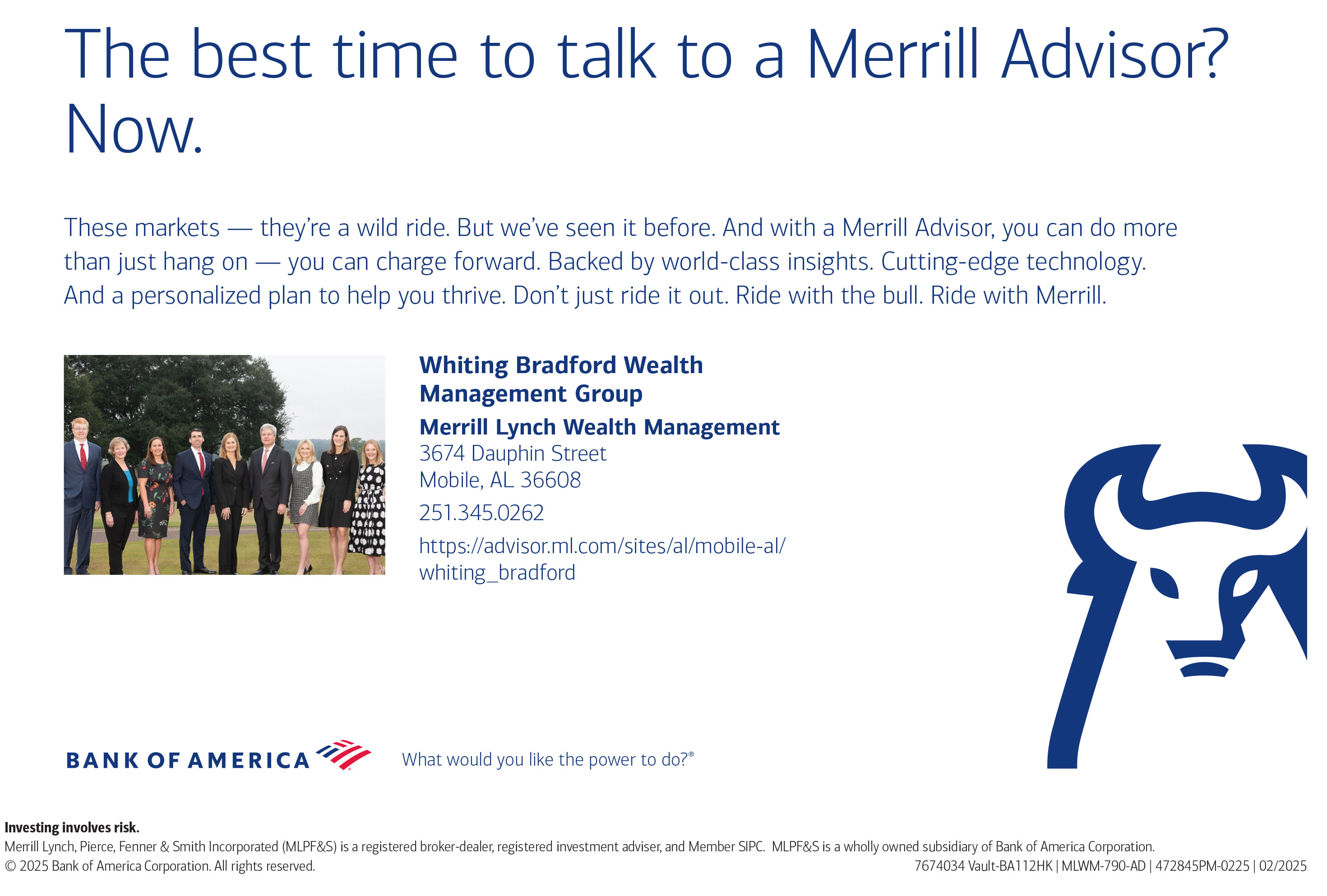
Since Casi Callaway stepped away in 2021 from her position as Executive Director to become the first Chief Resilience Officer in the State of Alabama, Mobile Baykeeper has had new leadership. Taking her place as Executive Director at Mobile Baykeeper is William Strickland. I first met William several months ago, when he made a presentation to the Point Clear Property Owners.
A native of Tuscaloosa, William earned his Civil Engineering degree with a minor in Environmental Engineering from the University of Alabama. As the quarterback at Northridge High School, he switched to receiver when he was recruited to Coach Saban’s second Freshman class.
“During my football experience, I learned a lot about leadership from Nick Saban,” he says. William spent much of his youth outdoors, hunting and fishing in Sumpter County with his grandfather, Bill Strickland, an avid turkey hunter. Bill instilled in William an appreciation for the outdoors and the environment.
“He was very involved in the Wild Turkey Federation. He was a big conservationist. He told us that we shouldn’t eat the fish we caught because of what the people had done upstream. I learned to be thoughtful about what we do to affect our neighbors.” After college, he worked with an environment consulting company as a regulator on industrial projects.
After two years, he was disillusioned and decided to seek another career path. “The projects I was involved in were sometimes contentious, and we were charged with overseeing that the minimum requirements were met, and no more. I decided it wasn’t for me and took a year off and did a summer in Europe. I shifted my focus to faith-based work in South Asia: India, Bangladesh, Nepal, and more.”
With lots of travel adventures around the world under his belt, William joined Mission ONE, based out of Phoenix, AZ. The work involved community development and cross-cultural partnerships with local-led church organizations in Africa, Asia, and the Middle East.

“The communities we worked with had the answers about best practices to build clean water wells. We were there to help facilitate resources and get as much done as possible.” Living out West in Phoenix had its benefits, too. William enjoyed access to rock climbing, white water rafting on the Colorado River, and fly fishing. “I spent a lot of time outdoors.”
Along the way, William earned a master’s degree in Theology. His longest paper was on stewardship and living in harmony with the rest of creation. When two things happened, COVID and his grandfather’s passing, his desire to get closer to home led him to Mobile, where he saw a job opening for Mobile Baykeeper’s Executive Director position.
“I moved here for this job and started in June 2022.” We discuss the major points of emphasis that drive Mobile Baykeeper’s mission. “The Mobile River Delta has the fourth largest volume of water flowing in the United States. That’s huge. We are also one of the most biologically diverse places in the world.”
He goes on, “Yet we have more industrial input of known toxics than most places in our nation. That plus sediment, sewage, and nutrient pollution put a lot of pressure on our ecosystems and eventually human health.”
The need to address these issues in a constructive, positive way drives William’s passion. You get the sense that he seeks a community that wants to understand the issues better and find workable solutions. The message is that we should do better with the unique natural environment that we have in the Scenic 98 Coastal area.
“When I took this position, I felt we needed to articulate our core values to the public. We wanted to focus on the biggest issues and opportunities, and we needed to focus on the future.” He tells me Mobile Baykeeper strives to be scientifically accurate and culturally relevant. “There are no easy wins, but we do have answers to successfully protect, preserve, and restore, especially clean water, for future generations.”
What does success look like? I asked. “We will know we are successful when no one has to ask if it’s safe to swim or if the fish are safe to eat.” Can the damage be fixed? I ask. “Absolutely!” Tampa Bay has recovered its seagrass. The business community came together to fix the problem. Seagrass is an answer to clear water and abundant sea life.”
William refers to the book, The Gulf, by Jack Davis. “People used to live in harmony with the land. Historic European logs demonstrate the people living along the coastline were larger because of an abundance of food available both on land and in the sea. If we’ve done as much damage to our environment in a generation, we can undo it in a generation.”
“It’s not about economics. Economics is about the flow of money. It’s about who’s getting the money.” He tells me Alabama has the least regulations and the highest pollution rates of any of our neighboring states. “We are 30 years behind. Our State regulations are well below the Federal recommendation for toxics, nutrients, and development practices. We need much better wetland protection and enforcement of sewage overflows.”
He tells me we have zero nutrient criteria. “As it stands, you can put as many nutrients as you want into the water. Nutrients create the algae blooms that can suck oxygen out of the water and prevent seagrasses from growing. Without vegetation there is nothing to stabilize sediment, thus destroying natural oyster beds that filter the water and keep it clean. This is also the natural fisheries habitat.”

“It’s a complex answer, but it’s doable. By investing in our field research team, we’ve selected about a dozen important projects to address. Our 2023 budget doubled, and we’ve more than tripled our private donations. We are seeing people coming to the table that want to see this situation fixed. They are ready for a change. It’s encouraging.”
William tells me that Mobile Baykeeper doesn’t know what the area was like in the past, and what brought us to where we are today. “We do know what people who have lived here all their lives tell us. We take that knowledge and try to do something with it.”
William’s message is one of hope. He believes we will return to living shorelines within the next 15 years. “People are ready for a change. My friends who hunt in the Delta feel that way. If you want healthy water, we can do something about it, but it takes what it takes.”
So, what are the main things Mobile Baykeeper says need to happen? “Four things,” says William:
- Decrease sedimentation in Mobile Bay to promote clean water and healthier fisheries
- Stop allowing toxics to enter our waterways that make it unsafe to swim and fish
- Decrease nutrients that create the algae blooms that prevent seagrasses from growing
- Stop sewage spills and overflows that contaminate the water and the fish we eat
“If we do all that, we will start to see the health of the water come back. It’s a process of trial and error. Right now we aren’t even allowed to try.” He tells me that ADEM (Alabama Department of Environmental Management) has a hard job.
“They are underfunded and overworked. Alabama is often the least-funded environmental agency per capita in the United States. Elected officials direct the people who are responsible. Instead of working for the common good, it seems they are working to benefit the few. We must hold our public officials accountable.”
“Coach Saban used to say, ‘If you want to be good, you don’t have a lot of choices because it takes what it takes.’ The same thing applies here. If we want our children and grandchildren to inherit healthy waters, we don’t have a lot of choices because it is going to take what it will take.”
In closing, I asked William what we can do as concerned citizens in the Scenic 98 Coastal communities. “Make small choices every day. Educate yourself. Give us, and organizations like us your support. Make your voice heard. Finally, get involved and write or call your public officials and let them know that this is not okay.”
Thank you, William. That was enlightening, to say the least. I appreciate your passion and dedication.




























